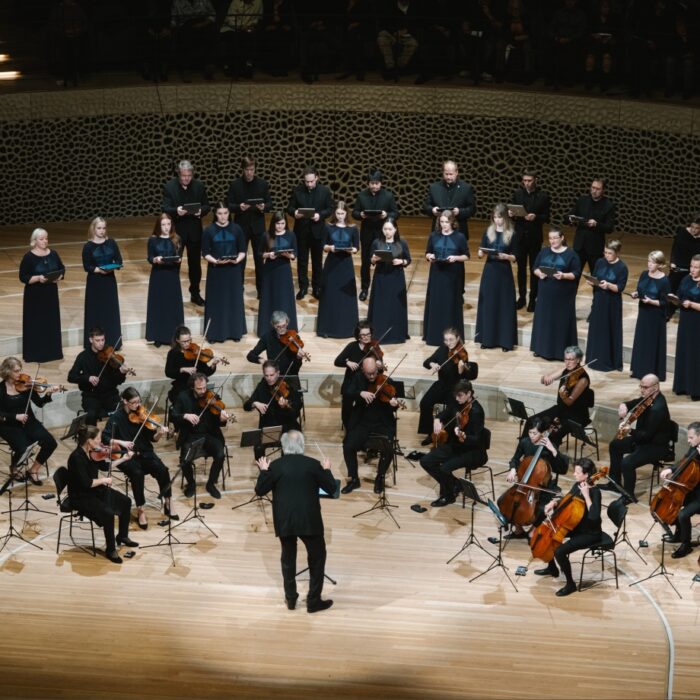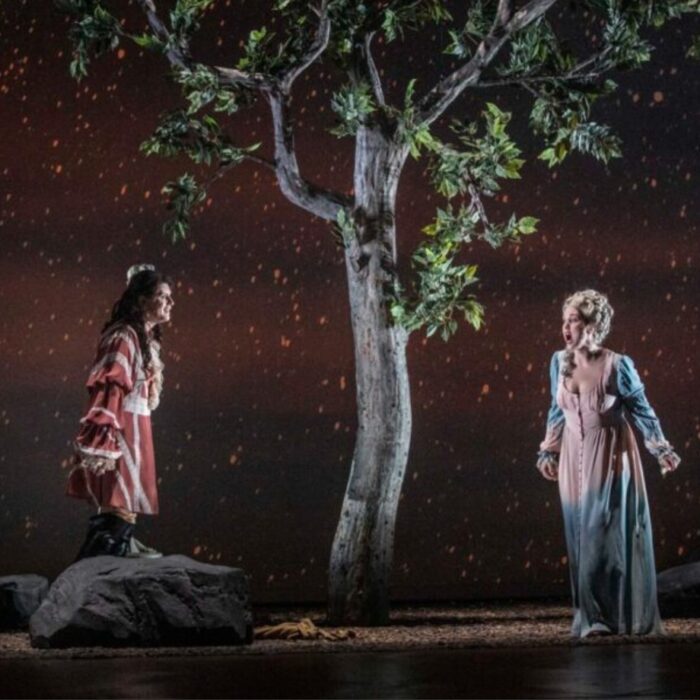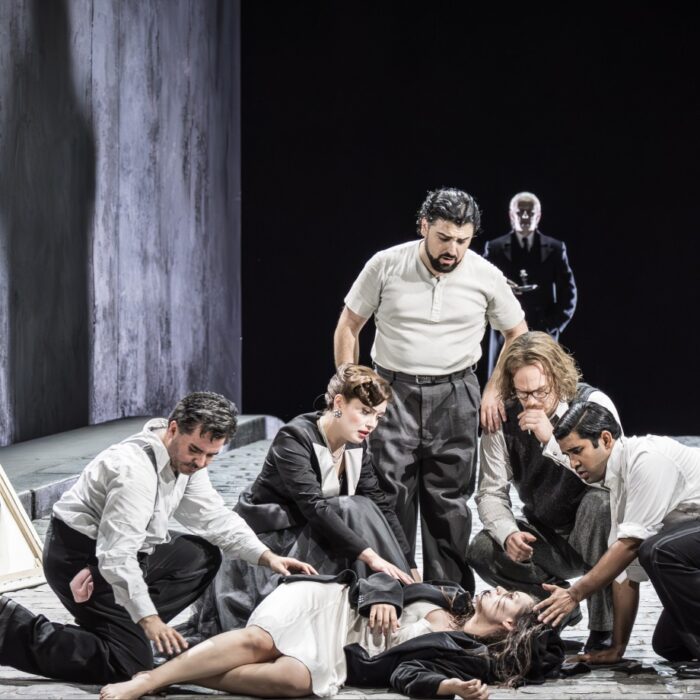
‘Don Giovanni’ Is One of the Greatest Works Ever Written. Why Is It So Hard for Directors to Get Right?
Examining Both David Hermann’s & Robert Icke’s Productions Leads to Further Questions About ‘Don Giovanni’s’ Dramaturgical Equilibrium
By A.J. Goldmann(Photo: © Monika Rittershaus)
“Don Giovanni” is an opera of seductions and escapes, moral wreckage and divine retribution, a shimmering mosaic of comedy, tragedy, farce, and existential dread. Yet “the mother of all operas” is also a uniquely treacherous work—at once alluring and intractable, irresistibly open yet elusive.
Music’s sublimity rarely fails to connect with audiences, even in a less-than-stellar musical performance. But figuring out how to stage “Don Giovanni” is a problem that has bedeviled and bested many a director.
The shapeshifting score, coupled with Lorenzo Da Ponte’s richly ambiguous libretto, with its vivid characters with wild tonal shifts and sparse stage directions, continues to attract and confound seasoned directors. The opera’s extraordinary breadth creates a fundamental ambiguity; the very openness that makes it endlessly fascinating also makes clarity tantalizingly out of reach. With strong elements of philosophical inquiry and social critique, it becomes a prism through which human desire, morality, and mortality are refracted in multiple directions. Directors inevitably face the temptation—and the peril—of imposing coherence upon this heterodox and protean text.
Unlike more narratively straightforward works, such as “Tosca” or “Rigoletto,” whose dramaturgical clarity typically benefits from minimal directorial interference, “Don Giovanni” demands that a director wrestle with it, albeit without pinning it down or simplifying it.
In 2020, I interviewed Romeo Castellucci about his Salzburg production of “Don Giovanni” planned for the festival’s centenary edition but postponed to 2021 by the COVID-19 pandemic. The Italian director told me that he considered the work “an enigma that can’t be solved.”
I’ve sat through “Don Giovannis” of all conceivable stripes: high concept, no concept, traditional, ultramodern, minimal and opulent. Whether a production works, or not, ultimately has less to do with how clever its director is than whether he or she decides to meet the piece on its own terms. One can tell almost immediately when a director chooses to engage seriously with the piece or when they just want to use it as a bit of window dressing for pretty music or as an excuse for grafting an entirely disconnected narrative onto the work.
This summer provides a particularly vivid demonstration of this directorial dilemma, with high profile “Don Giovannis” premiering at two of Europe’s leading opera festivals. At the Bayerische Staatsoper, the German-French director David Hermann inaugurated the 150th Münchner Opernfestspiele (which runs until July 31) in late June with the house’s first new “Don Giovanni” in over 15 years. A mere week later, Robert Icke’s staging of Mozart’s dramma giocoso at the Festival d’Aix-en-Provence was the acclaimed director’s first foray into opera.
David Hermann’s Production Proves Dramatically Cumbersome
Hermann’s production was the final installment in Munich’s new Da Ponte Trilogy, which kicked off with Benedict Andrew’s witty and energetic “Così fan tutte” in 2022 and continued the following year with Evgeny Titov’s cluttered and chaotic “Le nozze di Figaro,” set on a marijuana farm. Hermann’s “Don Giovanni” was anchored by a bewildering mythological frame that introduced Proserpina and Pluto as symbolic figures who merged with and possessed Don Giovanni repeatedly over the course of the evening. (Yes, Zerlina, Masetto and Leporello do sing “Resti dunque quel birbon / con Proserpina e Pluton” in the final scene, but what of it?)
The concept proved dramatically cumbersome, and the production often dangled awkwardly between literal drama and allegorical abstraction. The mythological theme felt both random and like an afterthought: a tepid attempt for the director to leave his stamp on this work. In the end, however, it was easy to just ignore this arbitrary frame and treat Hermann’s production, with Jo Schramm’s elegant, modular set (enlivened by Sibylle Wallum’s pastel-colorful costumes) as an elegant presentation case for an opera that was finely cast and expertly prepared.
Konstantin Krimmel made an impressive debut in the title role. The German baritone has been a constant in Munich’s new Da Ponte cycle, having previously appeared as Guglielmo and Figaro. He sang a suave and unusually sympathetic Don Giovanni. I appreciated the youthful and unexpectedly bright characterization, though I also look forward to Krimmel’s account of the role deepening. (He returns for next season’s revival.) With brilliant, agile singing and energetic acting, American bass-baritone Kyle Ketelsen’s Leporello felt authoritative. Vera-Lotte Boecker’s Donna Anna soared above the orchestra, although I found her interpretation to be somewhat one-dimensional. Samantha Hankey, a winning Octavian in Barrie Kosky’s Munich “Rosenkavalier,” switched gears impressively to embody a fiery and impassioned Elvira. American soprano Avery Amereau beautifully rounded out the female cast as a delicate and feisty Zerlina. The supporting men – Giovanni Sala‘s Ottavio, Michael Mofidian’s Masetto and Christof Fischesser’s Commendatore – also fared well.
In the pit, Vladimir Jurowski presided over a precisely calibrated performance whose analytic clarity did not come at the expense of dramatic propulsion. The Bayerisches Staatsorchester responded to his careful baton with muscular and mercurial playing that was alive to the score’s dazzling range, its varied styles and fluctuating moods, its moments of humor, horror, tragedy, absurdity and introspection. Individual without being fussy or idiosyncratic, it was a reading that was neither slavishly beholden to period refinement nor guilty of Romantic overreach. With a kaleidoscopic mastery of the score, Jurowski acknowledged and embraced the opera’s fascinating contradictions far more completely than Hermann and his team.
Robert Icke’s Production Generates Tensions That Never Fully Resolve
This summer’s Festival d’Aix-en-Provence (ongoing until June 21) has been marked by the sudden and unexpected loss of its artistic director, Pierre Audi, who died in May at the age of 67. When I last saw him, at the mid-March premiere of his well-travelled “Alcina,” in Rome, Audi told me that it hadn’t been easy to convince Icke to take “Don Giovanni” on. I would have loved to discuss with this gifted and innovative British director – I’ve reviewed productions by him in Vienna, Stuttgart and Basel – but he wasn’t giving interviews in Aix.
On entering the Grand Théâtre de Provence for the Festival d’Aix-en-Provence, audiences were greeted by a “trigger warning” displayed on the surtitle console: The show has intense sound effects that may surprise you. Thank you for your understanding.
I settled into my seat expecting a barrage of amplified explosions and screams calibrated to jolt spectators out of their sense of complacency; perhaps even to hold them to account for enjoying and even admiring Mozart and Da Ponte’s murdering, raping aristocrat. As an opera and theatergoer in Germany for nearly two decades, I’m used to such provocations – and quite often enjoy them! Curiously, however, no earsplitting SFX were forthcoming. Over the next three hours and change, scratchy old gramophone records, a beating heart and horror-film-type effects (wind, static, a dull electric hum) sounded occasionally between arias, but they never reached the threshold requited for “intense.” Icke was simply applying diagetic and extradiegetic sounds to opera much the way he would if he were staging Chekhov or Ibsen. And while it was debatable whether the effects in question enhanced the production, announcing them in advance felt like a “précaution inutile.”
In truth, no number of caveats would have sufficed to prepare an audience for Icke’s take on “Don Giovanni,” an ambitious and original interpretation that took David Lynch and Mark Frost’s seminal TV series “Twin Peaks” as a source text.
Throughout 1990, primetime America was gripped by the mystery of who killed Laura Palmer, a homecoming queen whose plastic-wrapped corpse is discovered at the beginning of the series. What starts as a soapy procedural, where everyone in the eponymous fictional small town is a suspect deepens into something far deeper, stranger and supernaturally, cosmically sinister. Eventually the series becomes an investigation into the nature of evil itself, with the irrational and unspeakably cruel lurking in the most innocent-seeming domestic configurations.
The Lynchpin–pardon the pun–of Icke’s production seemed to be the bifurcated identity of Laura Palmer’s killer, revealed (midway through the second season) to be her father, Leland Palmer, acting under the orders of a malevolent spirit named Bob. Or has Laura Palmer merely invented Bob as a coping mechanism to avoid confronting the trauma of being repeatedly raped by her father?
Icke grafts the Leland / Bob duality onto the Commendatore and Giovanni, presenting the entire opera as recollections of an elderly sexual predator who is nearing death. The identification of the Commendatore with Giovanni (and vice versa) generates tensions that Icke never fully resolves. Donna Anna, who increasingly–yet never fully–comes into focus as the production’s center of consciousness, is a survivor of incest who has dreamed up Giovanni as a bête noir in order to avoid the awful truth. Elvira is a spouse complicit in her husband’s abuse and his tacit accomplice, whose motherly (or step-motherly) sympathies for Anna are held in check by her jealousy.
Onstage, the Commendatore and Giovanni frequently merge as they both are made to confront their victims, first in the beauty pageant Icke serves up to illustrate Leporello’s catalogue aria (at the line “La piccina è ognor vezzosa,” a pubescent girl walks onstage in oversized heels) and later in a series of uncanny black and white videos showing emaciated, scantily clad women posed like mannequins in a narrow room ringed with billowing curtains (a setting that brings to mind the similarly-curtained Red Room in “Twin Peaks”).
These are intriguing propositions, but one of the production’s main shortcomings is that Icke doesn’t quite know what to do with the other main characters, except perhaps with Ottavio, trying and failing to be the supportive boyfriend of a traumatized woman. That Zerlina and Masetto’s roles are left vague is perhaps not too unfortunate–they are secondary characters, after all–but Leporello remains an enormous question mark. Who or what is he in this production? Giovanni is already a spectral figure, flitting between dream and waking and between life and death. Leporello, so often seen as Giovanni’s foil, lacks definition in Icke’s directorial vision and that creates a gaping hole in the middle of his production.
I have a high tolerance for radically revisionist, deconstructive or updated productions of the classics. In concept-driven productions like Icke’s, it’s rarely the case that everything lines up; nor do they have to. But a director should ideally approach a theatrical or operatic text ready to engage with its unique challenges and peculiarities and come up with dramaturgical solutions.
Sitting through this premiere, I found little evidence that Icke was aware of what makes “Don Giovanni” a veritable minefield for directors, but much to suggest he was eager to impose a bold concept on one of opera’s greatest acknowledged masterpieces. We might have witnessed a more felicitous marriage of concept and source material had Icke paid more attention to what Mozart’s music actually says: the points where it comments on and even contradicts what is happening in the libretto; or when it complicates how we think about a character or situation. One of the central failings with Icke’s staging was that often what we saw onstage seemed to run on a different track entirely than the music, performed with crackling and incisive dramatic verve by Simon Rattle and the Symphonieorchester des Bayerischen Rundfunks.
In an age of quirky, mannered, unnecessarily drawn-out and ponderous “Don Giovannis,” Rattle and the Munich players dispatched a fluid and graceful reading that was alive to the nuances and tonal shifts in the score without being fussy. The swift, forward movement was sustained by the elegant winds and mighty horns.

(Photo: © Monika Rittershaus)
The premiere was also beautifully cast, with the South Tyrolean baritone Andrè Schuen, a towering presence in the title role, singing with seductive and darkly lacquered tones. The South African soprano Golda Schultz sang an uncommonly steely Donna Anna, tossing in well-judged ornamentation into a virtuosic and emotionally raw performance. Clive Bayley made for an effectively bone quaking Commendatore. Magdalena Kožená’s Elvira was not the seria shrew that she is often portrayed as and here Icke’s directorial interventions cast her entreaties and warnings in a new and altogether less humorous light. Kožená remains a skillful and subtle singer, even if she is somewhat past her vocal prime. Madison Nonoa and Paweł Horodyski, both graduates of Aix’s vocal academy, were well-matched as Zerlina and Masetto, while the Ottavio of Amitai Pati, another alumnus of the program, fared better in “Dalla sua pace” than “Il mio tesoro intanto.” That the Polish bass Krzysztof Bączyk made a surprisingly slight impression as Leporello seemed to owe much to how Icke’s production often treated him as an afterthought. The focus was very rarely on him, even during his big moments. In the catalogue aria, for instance, the audience’s attention was diverted not merely by the beauty pageant underway but also by unexpected presence of Giovanni, who spectrally observed his former victims as they swayed their hips along the catwalk.
If Icke decides to pursue opera in the future, he would be well advised to take a more musical approach. Watching his “Don Giovanni,” one rarely got the sense that he considered the music as a character. And often, he didn’t seem to listen to what the music was telling us. Why, for instance, provide a sound effect of a beating heart after the Commendatore is fatally wounded, when the music tells us as much? Icke also stumbled in his handling of the secco recitatives. Especially earlier on, these were drawn out and dispatched, often by Giovanni and Leporello, with a ploddingness that, far from suggesting theatrical naturalness (which I suspect was the effect Icke was going for), muddled things by slowing the production down with awkward exclamations and pauses. Icke fared much better in getting his singers to act. Schuen and Schultz, in particular, were physically expressive performers.
“Don Giovanni’s” Delicate Dramaturgical Equilibrium
Directors who attempt to solve “Don Giovanni” inevitably find themselves ensnared by its hybridity. The opera’s dramaturgical openness demands a delicate equilibrium: too much conceptual intervention risks reducing Mozart’s characters to mere symbols; too little risks banality.
The most memorable and successful “Don Giovannis” I have seen are the ones that approach the work on its own terms: Claus Guth’s forest-bound Salzburg staging, imagined as one long fever-dream after Don Giovanni has been fatally wounded in his duel with the Commendatore; Andreas Kriegenburg’s skyscraper-set Dresden production that managed to be both subversive and respectful; Barrie Kosky’s stripped-down Vienna production had everything to do with exploring the relationships between the characters; Castellucci’s Salzburg production, much improved when it returned in 2023, presented the opera as a series of enigmatic and archaic rituals that seemed to proceed by way of free association and intuition.
Within my lifetime, the Metropolitan Opera has struggled mightily with “Don Giovanni.” Met productions are typically designed to stick around for decades, but over the past quarter century I’ve watched the house cycle through no fewer than four productions, each stumbling in its own way. Franco Zeffirelli’s lavish 1990 staging, fully revamped in 2000, provided visual splendor but precious little psychological insight; Marthe Keller’s clinical modernism drained the piece of vitality; and Michael Grandage’s earnest period staging was lifeless and dramatically inert. Ivo van Hove’s recent production, with it minimal and austere aesthetic, finally seemed to break this unfortunate streak, even if its stark austerity–the elegant yet oppressive set, the nondescript costumes–makes it feel like an anonymous contemporary European staging.
Perhaps the first step for a director who dares to stage “Don Giovanni” is to acknowledge the impossibility of resolution itself. The most successful productions accept this irresolvable tension, inviting audiences to engage with “Don Giovanni’s” inexhaustible layers rather than straitjacket it into an interpretative framework.
When I spoke with Castellucci for the 2023 Salzburg revival, he referred to “Don Giovanni” as “an explosive object”—infinitely compelling, eternally unresolvable, forever daring directors to confront a truth they can explore but never master. We find Mozart’s genius in “Don Giovanni’s” perpetual elusiveness and in its stubborn refusal to be pinned down.
This summer’s twin “Don Giovannis” in Munich and Aix are apt reminders that directors approach “the mother of all operas” like moths drawn to flame, attracted by the work’s promise yet repeatedly scorched by its inherent contradictions.



